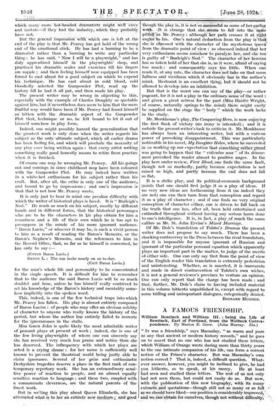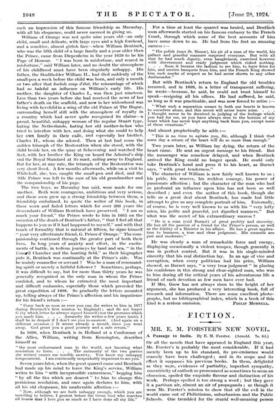A FAMOUS FRIENDSHIP.
William Bentinck and William III.: being the Life of Bentinek, Earl of Portland, from the Welbeck Col-res- pondence. By Marion E. Grew. (John Murray. 218.) - "IT was a friendship," says Macaulay, "as warm and pure as any that ancient or modern history records," and he-goes on to assert that no one who has not studied these letters, which William of Orange wrote during more than thirty years to the one intimate companion of his life; can form a correct notion of the Prince's character. But was Macaulay's- own notion correct 1' That is, indeed, a difficult question. What- ever answer, however, yOu might be inclined to give, he had you hitherto, so to speak, at his mercy. He at least had seen and studied these letters. The rest of us not only had not seen them, but could not easily do so. But now, with the publication of this new biography, with its many .. extractid quotations—though still not so many or so hill as we should have-liked--our position is considerably improved, ' and ive_einrobtain for ourselves, though not without difficult'
such an impression of this famous friendship as Macaulay, with all his eloquence, could never succeed in giving us. William of Orange was not quite nine years old—an only child, small and delicate, with large eyes and a high forehead, and a sensitive, almost girlish face—when William Bentinck, who was the fifth child of a large family and a year older than the Prince, came from Diepenheim in the year 1659 to be his Page of Honour. ".I was born in misfortune, and reared in
misfortune," said William later, and no doubt the-atmosphere of his childhood must have been singularly unhappy. His father, the Stadtholder William II., had died suddenly of the small-pox a week before the child was born, and only a month
or two after that foolish coup d'etat, the miscarriage of which had so baleful an influence on William's early life. His mother, the daughter of Charles I., was then just nineteen.
Less than two years before she had received the news of her father's death on the scaffold, and now in her widowhood was living with her child in a wing of the old Palace at The Hague, surrounding herself still with the atmosphere of royalty in a country which had never quite recognized its claims—a proud, beautiful, unhappy woman of the regular Stuart type, hating the Netherlands, hating her old mother-in-law who tried to interfere with her, and doing what she could to help her own family in their exile, and especially her brother, Charles II., whom she adored. Then at last had come the sudden triumph of the Restoration when she stood, with the child beside her, on the quay at Schevening and watched the fleet, with her brother the King on board the Admiral's ship and the Royal Standard at its mast, sailing away to England. But for her, at any rate, the triumph of the Restoration was very short lived. A few months afterwards, while on a visit to Whitehall, she, too, caught the small-pox and died, and the little Prince was left to the care of his old grandmother and the companionship of his page.
The two boys, as Macaulay has said, were made for one another. Both were courageous, ambitious and very serious, and there soon grew up a strong friendship between them, a friendship embalmed, to quote the writer of this book, in
these worn and faded letters which for over 200 years the descendants of William Bentinck have preserved. " I am so much your friend," the Prince wrote to him in 1665. on the occasion of the death of Bentinek's father, " that I feel all that happens to you as if it had happened to myself," and with that touch of 'formality that -is natural at -fifteen, he -signs -himself
" your very affectionate friend, G. Prince d' Orange." The com- panionship continued through the greater part of both their lives. In long years of anxiety and effort, in the excite- ments of battle, in tedious journeys by land and sea, " in the Counril Chamber and the hunting field," as their biographer puts it, Bentinck was continually at the Prince's side. Was he mainly counsellor or servant ? Was he a man of command- ing spirit or merely a faithful follower ? Sometimes, perhaps, it was difficult to say, but for more than thirty years he was generally recognized as the only man in whom the Prince confided, and to whom he entrusted the most important and difficult embassies, especially those which preceded the great expedition -of 1688. So gradually the letters mounted up, telling always of the Prince's affection and his impatience for his friend's return :-
"Come back as soon as ever you can (he writes to him in 1677 during Bentinck's first mission to England) ; and do not forget G (by which letter he always signed himself) nor the promises which you made him. . . . Assuredly (he writes a few years_later), I shall be in despair if I don't see you to-morrow. (And again on a different occasion :) It -seems already a month since you went away. God grant you a good journey and a safe return."
In 1690, when Bentinck is in Holland at a Conference of the Allies, William, writing from Kensington, describes himself as " the most embarrassed man in the world, not knowing what resolution to form. . . . The animosity of the two parties (he writes) causes me terrible anxiety. You know my unhappy temperament. I am continually unspeakably impatient to see you."
Seven years later, when the great quarrel came and Bentinck had made up his mind to leave the King's service, William writdS' to him " with inexpressible earnestness," begging him " by all the ties which are dearest " to him to change this pernicidus resolution, and once again declares to .him, with
all his old eloquence, his unalterable affection :— " Now, although we are both unhappy enough, which you are unwilling to believe, I protest before the Great God who searches all hearts that I love you as much as I have done all my life." For a _time at least the quarrel was healed, and Bentinck soon afterwards started on his famous embassy to the French Court, through which some of the best accounts of him have come down to us. He had from the first an amazing success :— " His polish (says St. Simon), his air of a man of the world, his gallant and graceful manners surprised everyone. But with all that he had much dignity, even haughtiness, exercised however with discernment and ready judgment which risked nothing. . . . Soon it became the fashion to see him, to have fetes for him, and receive banquets from him, and the French King showed him such marks of respect as he had never shown to any other Ambassador."
But with Bentinek's return to England the old troubles recurred, and in 1699, in a letter of transparent suffering, he wrote—because, he said, he could not trust himself to speak—resigning all his offices. He had suffered, he said, as long as it was practicable, and was now forced to retire :- "What such a separation means to both our hearts is known to ourselves alone, and this secret will never leave mine. . . . I thought never to be deceived in judging of the feelings which you had for me, as you have always seen to the bottom of my heart which has never kept anything back from you, except some of these vexations."
And almost prophetically he adds :—
" This is no time to agitate you, Sir, although I think that some day a return of the heart will do so more than enough."
Two years later, as William lay dying, the return of the heart came. He sent an urgent message to his friend. But the messenger was somehow delayed, and when Bentinck arrived the King could no longer speak. He could only take Bentinck's hand and press it to his heart, as Burnet says, " with great tenderness."
The character of William is now fairly well known to us ; his pride, his reserve, his reckless courage, his power of passionate affection ; but the character of the man who had so profound an influence upon him has not been so well described ; and even the author of this book, though she tells us a great deal about Bentinck, has made but little attempt to give us any complete portrait of him. Externally, of course, he is very well known to us with his " very lofty mien, his polite and graceful, yet dignified manners." But what was the secret of his extraordinary success ?
"He is a man (said Burnet) of great probity and sincerity. He has all the passion of a friend for the Prince's person, as well as the fidelity of a Minister in his affairs. He has a great applica- tion to business,- a true and clear judgment. His counsels are just and moderate."
He was clearly a man of remarkable force and energy, displaying occasionally a violent temper, though generally it was in perfect control. But it was in his single-minded sincerity that his real distinction lay. In an age of vice and corruption, when every politician had his price, William showed, as Burnet says, " a -very true judgment " in placing his confidence in this strong and clear-sighted man, who was to him during. all the critical years of his adventurous life a friend of such devotion as few men have ever had.
If Mrs. Grew has not always risen to the height of her argument, she has produced a very interesting book,. full of research and information. There are some excellent photo- graphs, but no bibliographical index, which in a book of this















































 Previous page
Previous page